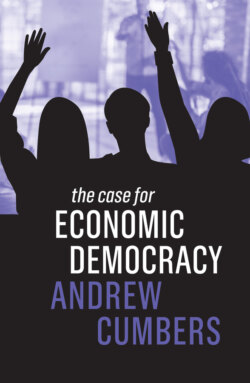The Case for Economic Democracy

Реклама. ООО «ЛитРес», ИНН: 7719571260.
Оглавление
Andrew Cumbers. The Case for Economic Democracy
CONTENTS
List of Figures
List of Tables
Guide
Pages
The Case For series
The Case for Economic Democracy
Acknowledgements
Introduction
The economic roots of the democratic crisis
The retreat from democratic scrutiny in economic policy
Making the case for economic democracy in the twenty-first century
Notes
1A Brief History of Economic Democracy as Industrial Democracy. Introduction
Struggles for economic democracy in the nineteenth century
The growth of a social democratic labour politics in the twentieth century
The Meidner Plan and the high tide of twentieth-century social democracy
The convenient fiction of Thatcher’s property-owning democracy
‘Stale, male and pale’: the exclusions of twentieth-century industrial democracy
Conclusion
Notes
2The Three Pillars of Economic Democracy
Individual economic rights and self-government
The necessity of labour self-government
Individual economic rights beyond the workplace
Democratic, collective and diverse public ownership
Creating a deliberative and participatory economic democracy
Conclusion
Notes
3Putting Economic Democracy into Practice
Institutions for implementing individual self-governance and economic freedom
Emergent tendencies in democratic collective ownership
Denmark’s collectively owned renewables revolution
Mondragon’s employee-owned enterprise network
Practising participatory economic decision making
Conclusion
Notes
Conclusion. Constructing the democratic economy
A summary of the main arguments and their policy implications
Mobilizing for economic democracy
Notes
References
POLITY END USER LICENSE AGREEMENT
Отрывок из книги
Sam Pizzigati, The Case for a Maximum Wage
Louise Haagh, The Case for Universal Basic Income
.....
The roots of this liberal democratic crisis go back to the 1990s and the centre left’s embrace of economic policies that largely served global business interests. While Margaret Thatcher famously announced in 1981 that ‘there is no alternative’ to business-friendly, market-driven economic policies, it is the acceptance of her creed by the governments of Blair, Clinton, Schroeder, Jospin and other supposed progressives that have arguably contributed as much to our current impasse. The centre left’s headlong embrace of economic deregulation, privatization and marketization, now collectively described as neoliberalism, and the retreat from a traditional concern with social justice and income redistribution, leave many lower income groups bereft of political power and support. The argument made then was that, in the face of globalization, old left policies no longer worked because business would go elsewhere if threatened; though like many compelling ‘common sense’ narratives, there is little ‘real-world’ evidence to back this up.2 Instead, the centre left told us, progressives should provide a favourable environment to attract business which would lead to more tax revenues that could then be spent on public services. The financial crisis was the end game of this laissez-faire equivocation, though many still seem dangerously unaware of this.
The espousal of neoliberal policy doctrine went hand in glove with the evacuation of democratic decision making from critical spheres of public life – especially economic policy – and their delegation to experts and technocrats. The best example is the tendency for politicians to make central banks ‘independent’. This is generally seen by mainstream media in a positive light. Surely it is just ‘good governance’ to put the setting of interest rates – critical for the wider economy in establishing the terms on which individuals and businesses are able to borrow and invest money – in the hands of ‘independent’ experts rather than interfering politicians? Those experts will take the longer view compared to the short-termist electioneering of career politicians.
.....